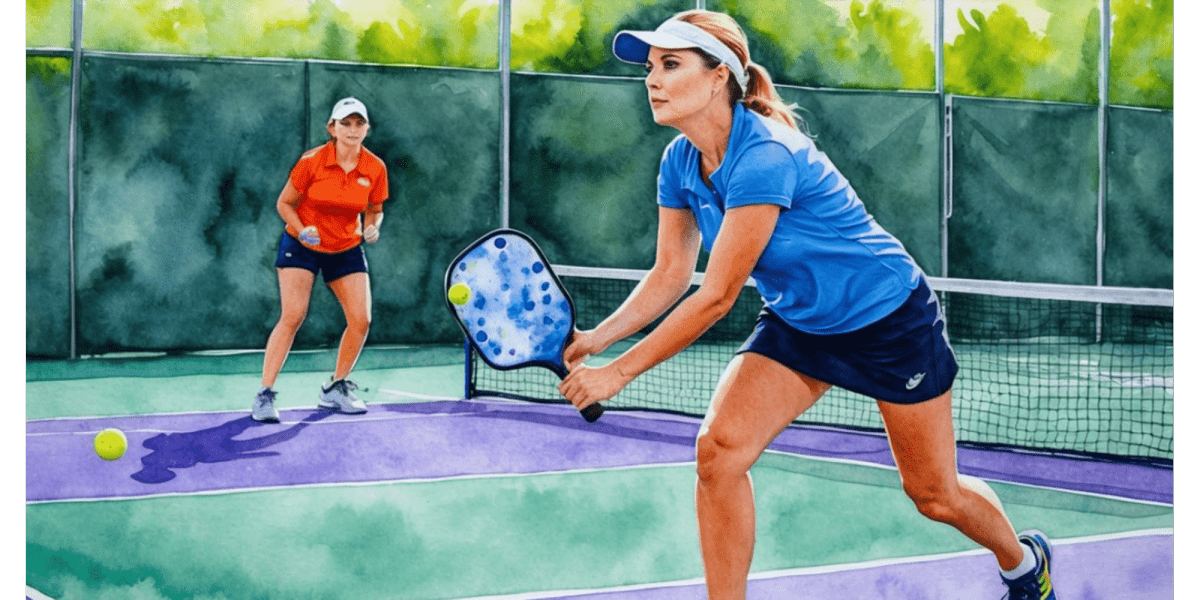Introduction:
Competitive pickleball requires more than just physical skill; mental resilience plays a crucial role in a player's success. In a game where pressure can change the tide instantly, players must learn to maintain their confidence and composure despite challenges. Building mental resilience enables them to recover from setbacks and perform their best, even when the game gets tough.

Players often face unforced errors and unexpected turns during matches. It is this ability to stay focused and positive that separates the champions from the rest. Developing a strong mental game helps athletes navigate these obstacles effectively, allowing them to turn challenges into opportunities for growth.
Confidence is essential in competitive play. When players believe in their abilities, they are more likely to take risks and push their limits. Learning how to cultivate this confidence, alongside resilience, can enhance a player's performance and enjoyment of the game.
Developing a Mental Game Plan

A strong mental game plan is essential for success in pickleball. This plan includes maintaining a positive mindset and being adaptable to challenges. Both elements help players stay focused and improve their overall performance.
Establishing a Positive Mindset
A positive mindset is critical for success in competitive pickleball. Players should focus on positive self-talk to boost confidence. They can create a list of affirmations like, “I am capable” or “I stay calm under pressure.”
Setting clear, achievable goals is another way to foster positivity. Goals can range from improving specific skills to winning matches.
Routine also plays an important role. Establishing a pre-game warm-up can help players mentally prepare and sharpen their focus. This approach sets a positive tone before entering the court.
Embracing Challenges and Adaptability
Challenges are part of any competitive sport, including pickleball. They can serve as opportunities for growth. Players should acknowledge obstacles rather than shy away from them.
Strategic thinking is vital during matches. Players need to assess their opponents and adapt their game plan as needed. This might involve changing their shot selection or adjusting their position on the court.
Staying calm under pressure enhances mental toughness. When facing setbacks, taking deep breaths can help players regain focus. They can remind themselves that challenges will ultimately make them stronger and better players.
Mental Resilience Training Techniques

Training the mind is essential for players who want to maintain resilience during competitive pickleball matches. Techniques such as mindfulness, concentration exercises, and visualization can significantly improve mental strength, focus, and overall performance on the court.
Mindfulness and Concentration Exercises
Mindfulness helps players stay present during games. This involves paying attention to thoughts, feelings, and sensations without judgment. Simple breathing techniques can enhance focus. For example, players can take slow, deep breaths for a few minutes before matches to calm their minds.
Concentration exercises include focusing on a specific task, such as the sound of the ball hitting the paddle. Players might also use short mental practices, like repeating a positive mantra. This can bring attention back to the current moment and reduce distractions, especially during high-pressure situations.
Visualization for Peak Performance
Visualization is a powerful mental training tool. Players can imagine themselves succeeding in different game scenarios. By picturing successful serves, returns, and overall strategy execution, they condition their minds for actual performance.
Mental rehearsal is a key part of visualization. Players should create detailed images of their actions, including timing and body movements. This process can be done quietly before matches or during practice. Regular visualization helps build confidence and prepares the mind for challenges, making it an effective part of mental resilience training.
Cultivating Grit and Perseverance

Grit and perseverance are essential for players facing challenges in competitive pickleball. Developing these traits helps players overcome setbacks and fosters a mindset of continuous improvement.
Overcoming Setbacks and Maintaining Focus
Setbacks are a part of any competitive sport, including pickleball. When a player faces a loss or an injury, remaining focused is crucial. She must recognize that each setback is an opportunity for learning and growth.
Strategies to Overcome Setbacks:
-
Analyze Performance: After a match, she should review what went wrong. This helps to identify areas for improvement.
-
Set Short-term Goals: Instead of fixating on the next tournament, focusing on small, achievable goals can create a sense of accomplishment.
-
Stay Positive: Maintaining a positive attitude even during tough times can help boost morale and focus.
A player can build resilience and stay committed to her goals by tackling obstacles head-on.
Continuous Improvement and Embracing Personal Growth
Continuous improvement is vital for success in pickleball. Embracing personal growth encourages players to develop their skills and adapt their strategies.
Ways to Encourage Continuous Improvement:
-
Seek Feedback: Players should actively seek input from coaches or fellow players to identify strengths and weaknesses.
-
Regular Training: Committing to a regular training schedule keeps skills sharp and builds confidence.
-
Attend Workshops: Participating in clinics or workshops can expose players to new techniques and strategies.
With determination and a focus on growth, players enhance their skills and cultivate a powerful sense of grit and perseverance essential for competitive play.
Performance Optimization in Competitive Play

Maintaining strong performance in competitive pickleball requires a mix of strategic decision-making and a solid pre-game routine. Players must focus on sharpening their mental acuity and managing performance anxiety to enhance their gameplay.
Strategies for Enhanced Decision-Making
Effective decision-making is crucial in fast-paced pickleball matches. Players can improve their performance by focusing on the following strategies:
-
Analyze Opponents: Understanding an opponent's playing style helps in making informed choices during the game. Identifying whether they prefer offensive or defensive strategies allows for tailored responses.
-
Practice Situational Awareness: Players should work on being aware of the game’s tempo and their position on the court. This awareness can lead to quicker and more strategic choices.
-
Visualize Success: Mental visualization techniques can enhance confidence. Imagining successful plays helps players prepare for real scenarios.
-
Stay Positive: Keeping a positive mindset boosts motivation. A player’s inner dialogue can significantly affect their performance during critical moments.
Pre-Game Routine and Stress Reduction
Developing a reliable pre-game routine is key to optimal performance. It gives players a sense of control and helps reduce stress. Here are effective practices:
-
Physical Warm-Up: Light exercises increase blood flow and prepare the body for action. Stretching can enhance flexibility, minimizing injury risk.
-
Breathing Techniques: Deep breathing exercises can calm nerves. This technique slows heart rates, allowing players to focus on the game instead of anxiety.
-
Positive Affirmations: Using positive affirmations can shift mindsets. Simple statements like "I am prepared" build confidence.
-
Game Plan Review: Going over strategies reinforces mental clarity. A clear plan simplifies decision-making during gameplay, ensuring quicker reactions.
Incorporating these strategies helps players optimize performance and maintain mental resilience in competitive pickleball.







